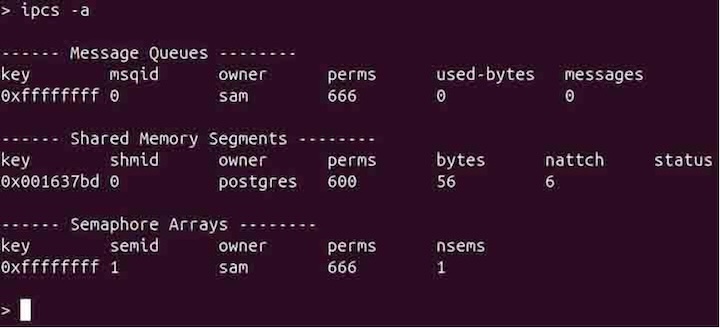
ipcclean Command in Linux
The ipcclean command in Linux removes shared memory and semaphores from a failed PostgreSQL server. The shared memory and semaphores are Inter-Process Communication (IPC) resources. IPC resources enable processes to communicate, synchronize, and share system resources.
The ipcclean command is a specialized tool intended primarily for PostgreSQL database administrators to clear out IPC resources, specifically shared memory segments and semaphore sets, left behind by a failed or crashed PostgreSQL server also referred to as postmaster.
Table of Contents
Here is a comprehensive guide to the options available with the ipcclean command −
- Legacy Tool Alert
- Syntax of ipcclean Command
- Using ipcclean Command in Linux
- Alternatives to ipcclean Command
Legacy Tool Alert
Note that the ipcclean command is an obsolete PostgreSQL script. It was discontinued after the PostgreSQL version 8.3 and is no longer maintained. It is designed for cleanup following a crashed PostgreSQL server. However, restarting the server will also clear the shared memory and semaphores, rendering this command of little use. Since newer versions of PostgreSQL automatically clean up after themselves, ipcclean is not often needed.
The ipcclean command is unavailable as a standalone package on Ubuntu or other Linux distributions, as it's an older, PostgreSQL-specific utility. Since it is deprecated, it's also unlikely to be found in modern package repositories.
Syntax of ipcclean Command
The syntax of the ipcclean command is as follows −
ipcclean
The ipcclean command does not take any option.
Using ipcclean Command in Linux
The ipcclean command must be executed with caution by the database administrators, as running this command on a live server can cause crashes. If this command is run while the PostgreSQL server is active, it will remove the shared memory and semaphores assigned to that server, leading to serious consequences for its operation.
The ipcclean command requires superuser (root) privileges to execute, as it involves removing shared memory segments and semaphore sets that may be owned by other users or processes.
sudo ipcclean
Alternatives to ipcclean Command
Instead of using ipcclean, use ipcrm and ipcs commands as alternatives for clearing shared memory and semaphores from a failed PostgreSQL server. The ipcrm command in Linux removes Inter-Process Communication (IPC) resources using their IDs or keys.
To display information about all IPC resources with their IDs and keys, use the -a or --all option with the ipcs command −
ipcs -a

To remove the shared memory by ID, use the -m or --shmem-id option with ipcrm command −
ipcrm -m 9

The ipcrm command does not produce output upon successfully removing IPC resources, as it is designed to perform actions without returning messages.
Similarly, to remove the shared memory by key, use the -M or --shmem-key option −
ipcrm -M 0x41000521
To remove the semaphore by ID, use the -s or --semaphore-id option with ipcrm command −
ipcrm -s 1
In the same manner, to remove the semaphore by key, use the -S or --semaphore-key option with the ipcrm command −
ipcrm -S 0xffffffff
It is important to note that ipcrm can be used across multiple applications, not only PostgreSQL.
Conclusion
The ipcclean command, previously used to clear shared memory and semaphores after a PostgreSQL crash, is now deprecated and unavailable in modern Linux systems. Newer PostgreSQL versions handle IPC cleanup automatically, making it obsolete. Instead, administrators can use ipcs to view IPC resources and ipcrm to safely remove specific resources by ID or key.
This tutorial explained the ipcclean command, its syntax, and usage, along with the alternative options.